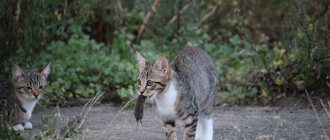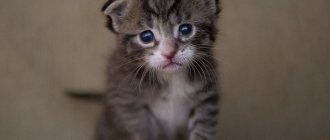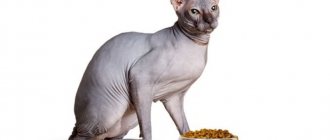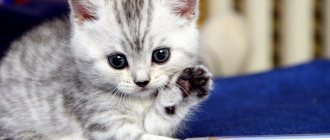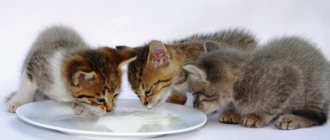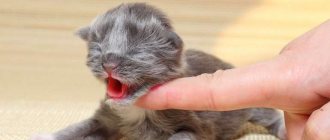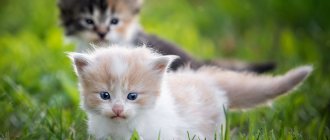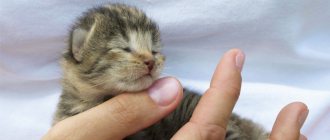Hello, dear blog readers!
If you are just getting ready to become the owner of a little furry friend, or you suddenly have a newborn baby, then this article will come in handy.
After all, taking care of the little ones is a pleasant chore and, at the same time, very responsible. The most troubling thoughts are: how to properly feed a fluffy? Especially if he is only a few days old, or maybe even hours old.
Of course, mother’s milk for babies is the key to proper development and good health; it is indispensable for the formation of strong immunity. And if there is no or little of it, is baby formula suitable for a kitten? In this case, it is necessary not only to feed, but also not to harm the cub.
Situations in which feeding problems arise
Most often, owners ask the question “Is it possible to feed a kitten baby food?” in a situation where, for some reason, the baby is left without a mother at too early an age. As a rule, a cat feeds its cubs with milk for up to two months. But there are cases when the mother abandons the baby, the kitten is taken from the breast early or given away by owners who do not care about the baby’s future. In this case, the new owner has a huge responsibility, because the life of a defenseless baby depends on how correctly the person feeds the kitten.
But even in a situation where a cat feeds its child itself, a caring owner should know that in order to better adapt to nutritious nutrition in the future, the baby should start feeding after three weeks of life. And after two months, when the pet’s milk teeth begin to appear, the mustachioed one will be able to gradually switch to solid food.
There are rare cases when an animal has an allergic reaction to cat food, and it is very difficult to balance the diet. Baby food will also come to the rescue. When feeding this way, it is necessary to carefully monitor the condition of the cat, its stool and behavior. Most often, such complementary foods help restore the intestinal microflora of a pet.
Why do experts recommend “dilute” your diet?
On almost all packages of quality food you will see recommendations regarding two types of feeding. The daily rate of dry food if it is not diluted with anything and the daily rate if dry food is diluted with wet food. What is the reason for this duality and why, in recent years, have veterinarians insisted on mixing wet and dry food?
Consequences of feeding only dry food
Dry food is produced in several stages. The products are crushed and dried. During the manufacturing process of food, its food base goes through several stages of heat treatment.
The granules themselves are formed from several types of powder: protein, carbohydrate, fat, mineral and vitamin components. To shape the granules, the mixed powder is slightly wetted, pressed and dried again. At the last stage, preservatives are added to the feed, which allow the granules to be stored in closed packaging for up to 3 years and unopened for up to six months.
After swallowing the granules, the cat feels very thirsty as the food begins to absorb gastric juice. In order for the granules to descend into the intestines, they must be saturated with moisture, become soft and more voluminous.
It is for this reason that when a cat eats the prescribed portion of dry food, it still asks for more for some time. The pet feels that the stomach is not full until the granules swell.
Before swallowing, an adult cat chews the granules into two parts. If you look closely at the process of food absorption, it will become noticeable that the incisors are practically not involved in chewing. Since kittens' chewing teeth are poorly developed, they have two alternatives: swallowing the pellets whole or chewing them with their front teeth.
Note that small kittens rarely control their feeling of fullness, which often leads to overeating. Regular, excessive intake of dry foods can lead to physical stretching of the stomach walls, leading to the problem of overeating on an ongoing basis.
Is it possible to feed a kitten only wet food?
Let us remind you that until six months of age, kittens should receive exclusively soft food. If you choose the industrial type of feeding, then the kitten must be fed wet or semi-moist food. When the baby turns 6 months or more, you need to think about adjusting the diet.
Constant consumption of exclusively soft food leads to reduced stress on the cat's gums. When a pet experiences hard food, its gums become stronger, which ensures a normal process of tissue renewal. If the chewing load is insufficient, the gums become loose and the teeth quickly deteriorate.
Veterinarians' opinion
Is it possible to feed a kitten baby food? Veterinarians disagree on this issue, as well as on many other things. They claim that baby food is formulated for human babies, and babies and kittens have different diets and unique digestive systems.
However, much more important are the reviews of experienced cat owners who have tested the benefits of baby food for kittens in practice. The owners note the excellent health of their four-legged friends, their cheerful, playful mood, good appetite, and all this thanks to such complementary feeding.
Is it possible to feed a kitten baby food? If we take into account the beneficial effects of the product on the health and lifestyle of small pets, it is appropriate to give a positive answer. Kittens can and should be fed baby food.
Features of feeding
It is important for owners to understand what kind of baby food can be given to a kitten. Not every formula is suitable for a baby. It is important to familiarize yourself with the composition of the product. You can feed the animal with both vegetable and meat mixture. The main thing is to avoid the following components in the finished product: salt, onion, garlic, starch. These elements are poorly digested and harmful to the cat’s body.
After the owner decides on the choice of complementary foods, the mixture must be diluted with boiled water in a 1:1 ratio. The kitten should be fed 3-4 times a day. You can use a pipette, syringe, or a special pacifier sold at a pet store. Simply carefully and slowly introduce the liquid into the animal’s mouth.
This is a painstaking and lengthy process, so the owner must be patient. The baby should be fed for at least 1.5 months. But do not forget that in the future the care shown for the kitten will return a hundredfold.
Hygiene procedures
In addition to nutrition, you should know other rules for caring for a newborn kitten. After eating, you can massage your cat's tummy clockwise with your fingers or the area under the tail, using a cotton pad soaked in water to empty the intestines.
Cats lick their cubs and try to keep their mouths, eyes, ears, and excretory organs clean. Wipe and wash the cat with warm and damp wipes, dry it so that it does not freeze after the procedures. Wash completely once a day in warm water.
The kitten needs a place to sleep and play at first. To begin with, a deep box is suitable, in which you need to lay soft bedding.
Cover your cat's area with old diapers or cut-up sheets so they can be easily washed or thrown away.
Milk for kittens
According to most veterinarians, kittens should not be fed any milk other than cat milk. The baby's body produces a special enzyme that allows it to digest the mother's product - lactase. With age, the secretion of the enzyme is reduced to a minimum, and for the baby, milk becomes a heavy food.
If the mother cannot feed the kitten, it would be best to find a cat who is ready to raise someone else's cub. If this is not possible, the owner will have to find a worthy replacement for breast milk.
If the kitten has to be fed artificially, then store-bought dairy products are definitely not suitable for this. It contains many harmful substances that negatively affect the health of cats.
Cow's milk is one of the best substitutes for store-bought products, but it is not nutritious enough and is not rich in the vitamins and minerals necessary for the cat's body.
Goat milk for kittens will be the best option for feeding. It is more nutritious, the composition is enriched with microelements necessary for a growing pet. Goat's milk is absorbed faster by the cat's body than cow's milk. An additional advantage for the animal is that the product is low-allergenic. To feed a kitten, goat milk must be diluted a little with water.
Cat food developers also came to the rescue. In the pet store you can find special mixtures that are milk substitutes. The composition of such products fully corresponds to the composition of the milk of a nursing cat and will allow the baby to fully develop without feeling any discomfort from the substitution.

